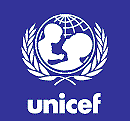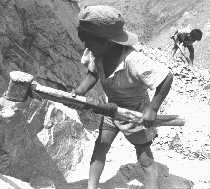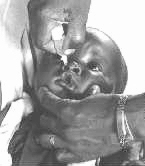 |
 |
| << return | ||
UNICEF, Chocolate, Hallowe'en, and other Miracles “By any of these gauges, there has been greater progress over the past fifty years than during the previous five-thousand years” writes Akaash Maharaj. |
||
30 October 1997 |
||
|
I have always felt that Hallowe'en is a miracle. When I was a child, it was almost more than I could believe that there was a single day that allowed us to miss the next day of school, dress in macabre costumes, and successfully solicit candy from strangers. One Hallowe'en gave credence to an entire year of Sunday School.
A typical latter day Hallowe'en would find us in a darkened room, hunched over a map of Toronto, debating the relative merits of the assorted spidery groupings of neighbourhood streets. In the background, flashlights were being tested, balaclavas fitted, and grease paint applied. Our own neighbourhood in Parkdale was a write-off: a succession of high-rises with little on offer but those damnable toffees in their unmistakable orange witches-and-ghosts wrappers, custom made for cheap and nasty neighbours for whom there was undoubtedly an equally cheap and nasty Hallowe'en hell. Where would we land our strike? Our eyes widened at intelligence reports of entire chocolate bars in the Kingsway, hauls from Rosedale that laughed plastic bags to scorn, and a house in High Park that stirred the curiosity of other pre-pubescent appetites. When we finally did trounce off on our foray, the small orange UNICEF boxes we carried were, perhaps, not foremost in our minds.
Since 1950, when a handful of children gave up their Hallowe'en treats and instead collected $17 in pennies for UNICEF, the Orange Box programme has grown dramatically to become a distinctively Canadian tradition. Last year alone, 2million Canadian children from 4 200 schools carried the Orange Boxes and collected $3.7million on that single day, one-fifth of UNICEF Canada's revenue for the year. As a now vital part of UNICEF's work, the human impact of Canada's trick-or-treating children is beyond all measure. During the brief fifty years since its foundation, UNICEF has been part of a human revolution which has seen the world literacy rate double; the proportion of rural families with access to safe drinking water soar from 10% to 65%; the under-five mortality rate fall by two-thirds; and world life expectancy grow by 50%, from 40 to 60 years. By any of these gauges, there has been greater progress over the past fifty years than during the previous five-thousand years. Moreover, although the cameras of the nightly news have remained transfixed by the drama of catastrophes, viewed through the lens of history, the previous and following decade will inevitably come to be seen as a decisive period in the human condition. Over the past ten years it has finally come within our power to defeat childhood's most ancient enemies. During the window of opportunity of the next ten years, we must hope to find the same compassion and resolve as our children to exercise that power.
The bitter irony is that adult convictions seem to be failing as quickly as these solutions are falling into our hands. Triumphs in communications have brought a global consensus on the major issues, advances in knowledge have yielded the instruments to address them, and massive increases in productivity have made the resources to deploy necessary programmes almost trivial. Only our will has not kept pace. We now live in an age when every child in the developing world could be provided with full nutritional and health care; when every primary age child could be schooled; when maternal mortality rates could be halved; when universal access to sanitation and clean drinking could be achieved; and when the total annual cost would be $34billion. By comparison, we also live in an age when instead, the world spends $400billion per year on cigarettes. The inescapable conclusion is that no child anywhere need suffer starvation or deprivation. So many millions do because in the adult world, it is simply not a priority that they should be spared. It is for this reason more than any other that I see a miraculous beauty in the efforts of children across Canada this Hallowe'en. In the face of a need so great that no one can help wanting to turn away, it is the weakest members of our society who answer the call more loyally than any others, who provide the strength for millions abroad. When I send my god-son off trick-or-treating with the sort of advice I would have greeted with contempt in my time, I expect he will by way of reply once again recite to me his annual lecture on the intricacies of Hallowe'en, including his UNICEF box. "It's for kids like us, but who don't have enough to eat," he explains patiently. "And," he often adds with much horror, "they can't even go trick-or-treating."
Akaash Maharaj is Chair of UNICEF Ontario's Youth Programmes Committee, a past Director of UNICEF at Oxford University, and a past Director of the Commonwealth of Nations Association for UNICEF. |
||
|
|
|
Remembering Desmond Tutu |
|
|
My article in the Globe and Mail |
|
TVOntario’s The Agenda |
|
|
Reflecting on the life of Queen Elizabeth II |
|
United Nations |
|
|
My address in the UN General Assembly Chamber |
|
CBC Radio’s The House |
|
|
The dirt on the federal two billion trees programme |
|
|
|
 The day was, of course, far too precious to
treat lightly, and as we progressed through our trick-or-treating
years, my contemporaries and I approached the event with ever increasing
sophistication.
The day was, of course, far too precious to
treat lightly, and as we progressed through our trick-or-treating
years, my contemporaries and I approached the event with ever increasing
sophistication. Despite
failing to otherwise stave off adulthood, Hallowe'en continues to
be a miraculous time for me. As my taste for chocolate has declined,
my responsibility for the United Nations Children's Fund Orange
Box programme has grown to compensate. Yet, as rewarding as it is
to be part of UNICEF's efforts to save the lives and improve the
quality of life of the world's children, it is impossible not to
sometimes feel unequal to the depth and breadth of suffering which
one confronts. Especially then, the miracle for me is that increasingly,
much of that suffering is being swept away by the efforts of Canadian
children on Hallowe'en.
Despite
failing to otherwise stave off adulthood, Hallowe'en continues to
be a miraculous time for me. As my taste for chocolate has declined,
my responsibility for the United Nations Children's Fund Orange
Box programme has grown to compensate. Yet, as rewarding as it is
to be part of UNICEF's efforts to save the lives and improve the
quality of life of the world's children, it is impossible not to
sometimes feel unequal to the depth and breadth of suffering which
one confronts. Especially then, the miracle for me is that increasingly,
much of that suffering is being swept away by the efforts of Canadian
children on Hallowe'en. The
examples are legion. Measles, which kills 1 to 2million children
a year, more than war and famine combined, can now be prevented
by a 15¢ vaccination. Diarrhoeal dehydration kills 3 to 4million
children a year, but can now be easily treated at a cost of 12¢.
Vitamin A deficiency, which imperils the lives of 200million children,
can now be reversed at a cost of 4¢ to 6¢ a year. Iodine
deficiency, which harms 1.6billion people and is the world's single
largest source of preventable mental disability, can now be controlled
for less than a penny.
The
examples are legion. Measles, which kills 1 to 2million children
a year, more than war and famine combined, can now be prevented
by a 15¢ vaccination. Diarrhoeal dehydration kills 3 to 4million
children a year, but can now be easily treated at a cost of 12¢.
Vitamin A deficiency, which imperils the lives of 200million children,
can now be reversed at a cost of 4¢ to 6¢ a year. Iodine
deficiency, which harms 1.6billion people and is the world's single
largest source of preventable mental disability, can now be controlled
for less than a penny.